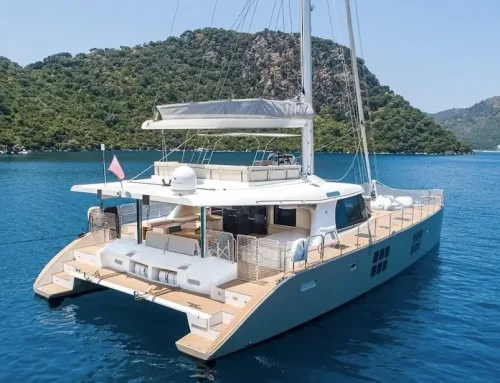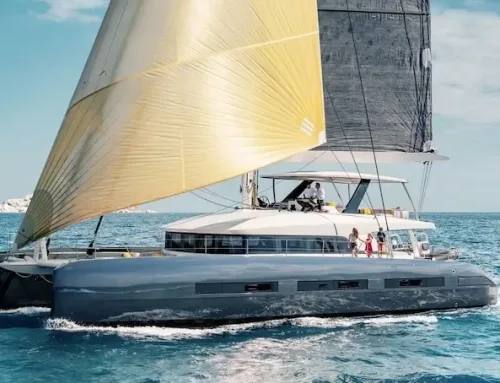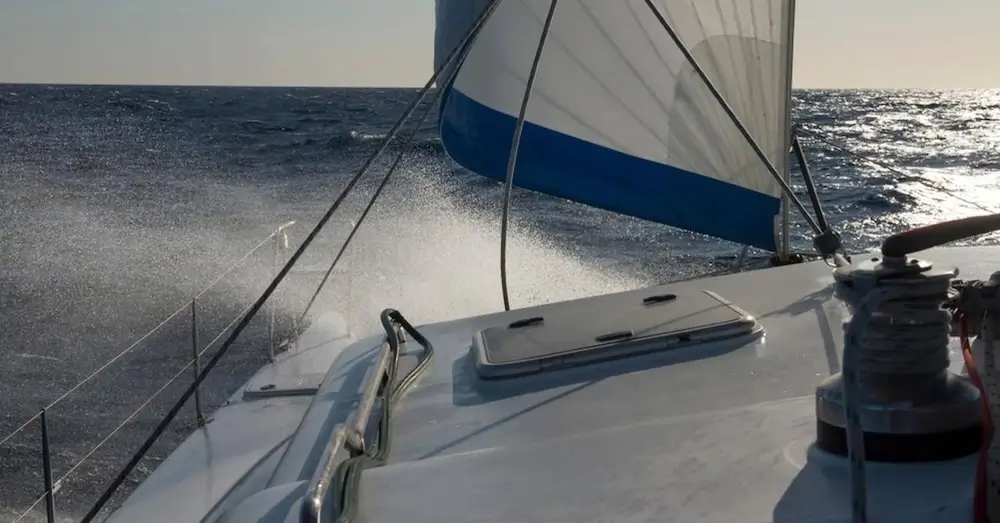
Are Catamarans Safe in Rough Seas?
Introduction: Setting Sail in Greece
Embarking on a Greece yacht charter adventure is a dream for many sailors. The azure waters of the Aegean and Ionian Seas beckon with their beauty and promise of idyllic sailing conditions. But even in this Mediterranean paradise, weather can be unpredictable, and rough seas are not uncommon. This raises an important question for those considering a yacht rental in Greece: Are catamarans safe in rough seas?
Understanding Catamaran Design
Dual Hulls: Stability and Comfort
The most distinct feature of a catamaran is its two hulls, which provide a wider base and more stability than traditional single-hulled vessels. This design minimizes rolling and can make for a more comfortable experience, especially in choppy conditions.
Weight Distribution and Buoyancy
Catamarans are designed to distribute weight evenly between the two hulls. This buoyant structure can offer advantages in rough water, contributing to its ability to handle waves differently than monohulls.
Catamarans vs. Monohulls: A Comparative Safety
Stability in Waves
The dual-hulled catamaran is often lauded for its stability. In rough seas, a catamaran’s broader beam can prevent excessive heeling, which might reassure those aboard.
Maneuverability Concerns
A catamaran’s wider shape can sometimes affect its maneuverability in tight situations. Skippers need to be adept at handling these vessels, especially in the unpredictable Greek waters.
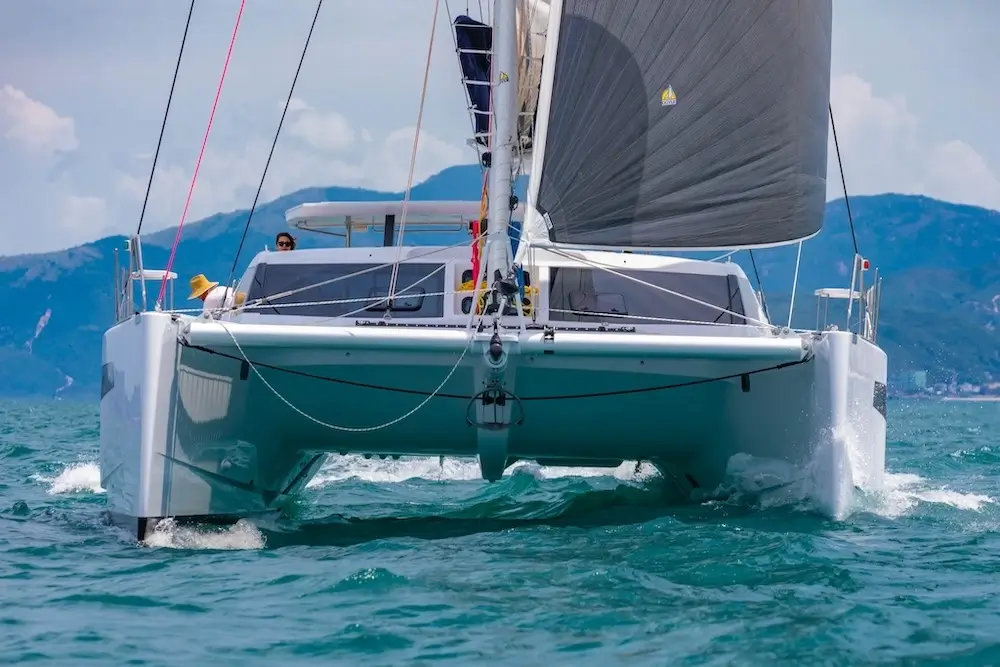
Are Catamarans Safe In Rough Seas 2
The Role of Skipper Experience
The Importance of a Seasoned Skipper
When chartering a catamaran, especially in areas where rough seas are possible, the experience of the skipper is paramount. A knowledgeable skipper, familiar with local conditions and catamaran handling, can significantly enhance safety.
Skipper Training and Certification
In Greece, skippers must be certified and are often seasoned sailors with extensive knowledge of the local seas. This is an essential factor in ensuring safety on a catamaran.
Weather in Greece: A Crucial Factor
Understanding Local Weather Patterns
The weather in Greece can vary greatly from one region to another. Knowledge of local weather patterns is crucial when sailing, especially in a catamaran, which may be more sensitive to certain weather conditions.
Seasonal Considerations
Different seasons bring different sailing conditions. In summer, the Meltemi winds can create challenging conditions for sailors. Understanding these patterns is critical for planning a safe journey.
Construction and Design Innovations
Modern Catamarans: Built for Rough Seas
Over the years, catamaran design and construction have evolved. Modern catamarans are built with rough seas in mind, incorporating features that enhance their seaworthiness.
Safety Features
From advanced navigation systems to reinforced hulls and automatic reefing systems, contemporary catamarans are equipped with numerous safety features that make them better suited for challenging conditions.
In the next section, we’ll delve deeper into how catamarans handle rough waters, including insights from seasoned sailors, safety protocols, and key features that contribute to a catamaran’s performance in unpredictable seas. We’ll also explore the allure of catamaran charters in Greece and how to ensure a safe and memorable sailing experience amidst the stunning Grecian landscapes.
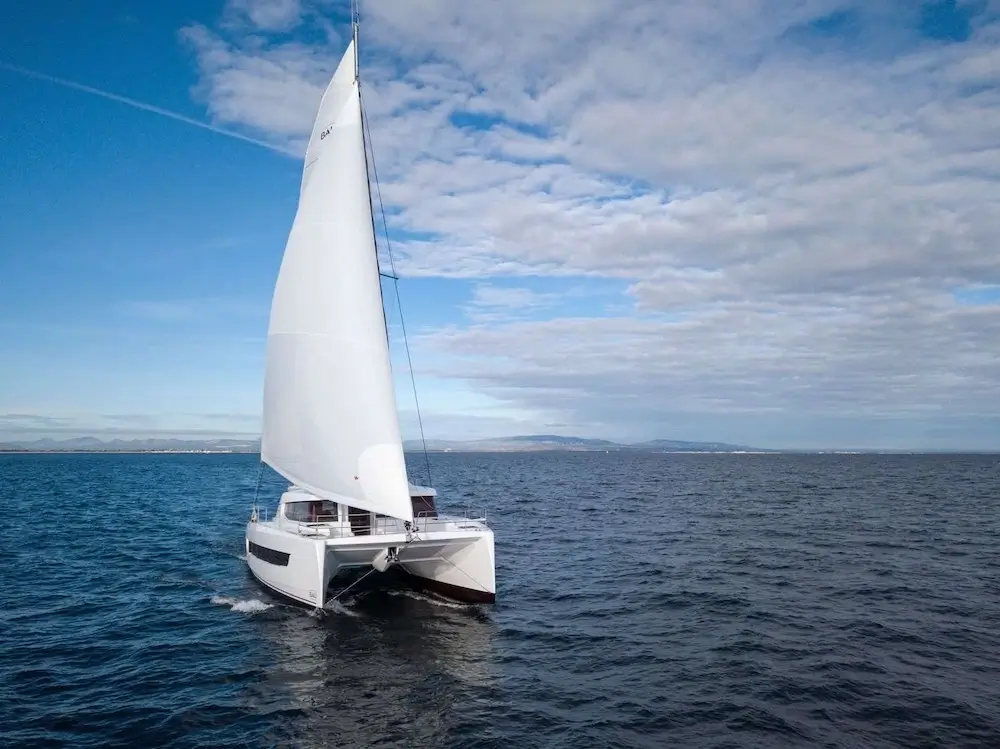
Are Catamarans Safe In Rough Seas 3
Navigating Rough Seas: Catamarans at the Helm
The Dynamics of Catamaran Sailing in Turbulent Waters
Understanding how a catamaran reacts to high waves and strong winds is crucial for safe navigation. Its wide stance on the water can make for a smoother ride over waves, reducing the risk of capsizing compared to traditional monohulls.
Safety Measures in Design
Modern catamarans are designed with safety as a priority. Many models come equipped with safety nets, handholds, and guard rails. The redundancy of having two engines and two rudders adds an extra layer of security.
Advanced Technologies Enhancing Safety
GPS and Autopilot Systems
The integration of GPS and advanced autopilot systems has made it easier to navigate and maintain course in rough conditions, a boon for catamaran charters in Greece.
Communication and Safety Equipment
EPIRBs, VHF radios, and other communication devices are standard on catamarans, ensuring that help can be reached in case of an emergency.
Catamaran Charter in Greece: Preparing for the Sea
Choosing the Right Catamaran
When planning a catamaran charter in Greece, selecting a vessel that matches the sailor’s experience level and the expected sea conditions is crucial.
Pre-Departure Checks and Briefings
Before setting sail, comprehensive checks and thorough briefings on the specific catamaran’s operations and emergency procedures are essential.
Handling Emergencies at Sea
Drills and Protocols
Regular drills and a clear understanding of emergency protocols can make a significant difference in response times and outcomes should a situation arise at sea.
Medical Kits and Life Rafts
Ensuring that medical kits are fully stocked and life rafts are in working order is non-negotiable for any seafaring vessel, particularly in a catamaran facing rough seas.
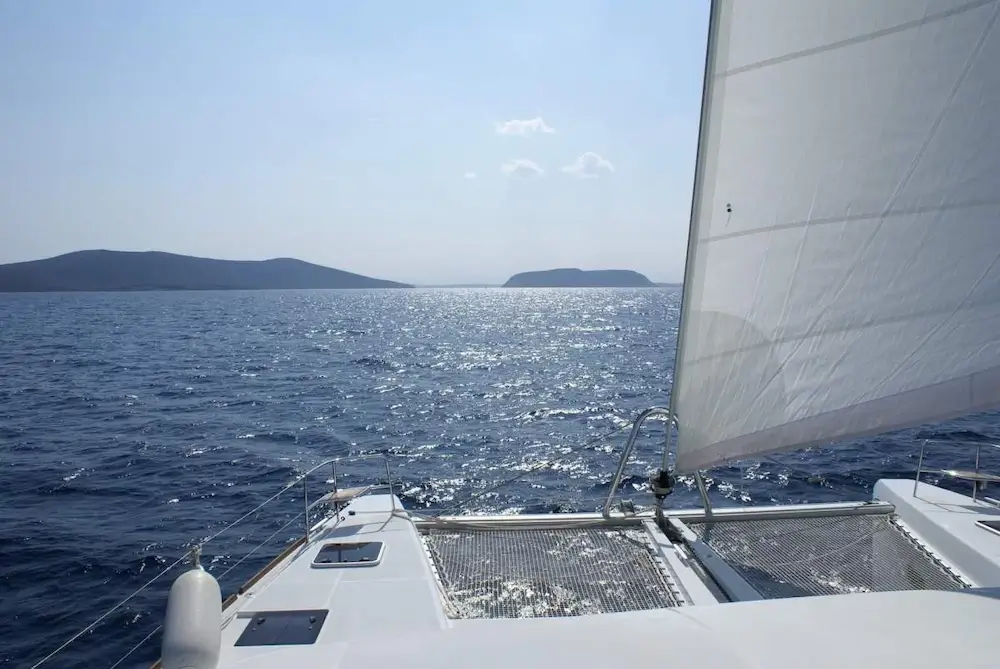
Are Catamarans Safe In Rough Seas 4
Catamaran Sailing Techniques in Adverse Weather
Reefing the Sails
Knowing when and how to reef the sails is a critical skill for maintaining control of a catamaran in high winds.
Navigating Waves
The approach to navigating waves can differ between catamarans and monohulls. Skippers must be adept at reading the sea and using the catamaran’s design to its advantage.
Case Studies: Catamarans Weathering the Storm
Real-Life Incidents and Learnings
Analyses of real-life incidents where catamarans have faced severe weather conditions can provide invaluable insights into their sea-keeping capabilities.
Testimonies from Experienced Skippers
Skippers who have helmed catamarans in rough seas offer a wealth of knowledge and practical advice on safety and handling.
Ensuring Your Safety: Tips and Tricks
Pre-Sail Weather Briefing
Always start with a comprehensive weather briefing. Understanding the forecast can prevent being caught off-guard by rough conditions.
Life Jackets and Personal Locator Beacons
The use of life jackets and personal locator beacons is mandatory for each crew member at all times during rough weather sailing.
Continuous Monitoring
Keep a continuous watch for weather changes and be prepared to adjust your sailing plan accordingly.
The Final Verdict on Catamaran Safety
Weighing the Benefits and Risks
When deciding between a catamaran and a monohull, it’s essential to weigh the inherent safety features of catamarans, such as stability and shallow draft, against potential risks like beam seas and windage.
Safety: A Shared Responsibility
It’s not just about the type of boat but also about the skills of the skipper and crew. Safety is a collective responsibility that involves preparation, knowledge, and respect for the sea.
The Role of Modern Equipment
With advancements in nautical technology, catamarans are equipped with state-of-the-art navigation systems, making them safer and easier to handle even for novice sailors.
Preparing for the Unexpected
Safety Drills: Not Just a Formality
Conducting regular safety drills is more than a formality; it’s a practice that could save lives, ensuring everyone knows how to act if the unexpected happens.
The Skipper’s Experience
A seasoned skipper’s experience is invaluable, particularly in rough weather. Hiring a skilled skipper can significantly enhance the safety of your yacht charter Greece.
Final Thoughts on Catamarans and Safety
Safety Is No Accident
Safety on a catamaran, as with any vessel, is the result of careful planning, good design, and competent seamanship.
Choosing the Right Charter
For those looking to charter a catamaran, choosing a reputable company that prioritizes safety and provides comprehensive briefings is critical.
Conclusion: Sailing with Confidence
Embarking on a sailing holiday aboard a catamaran can be a thrilling and safe experience. Whether you’re cruising the calm waters of the summer or braving the more spirited winds of the off-season, catamarans have proven to be reliable companions on the sea. With their spacious design, enhanced stability, and modern safety features, these vessels are more than capable of providing a secure environment for seafarers. However, it’s the combination of a well-maintained boat, a knowledgeable crew, and vigilant preparation that ensures the highest levels of safety. By understanding the dynamics of catamarans in rough seas, taking proactive safety measures, and learning from seasoned professionals, sailors can enjoy the azure waters of Greece with peace of mind.


